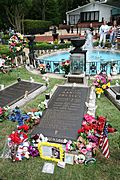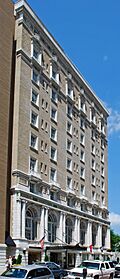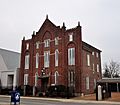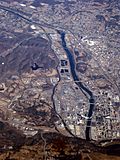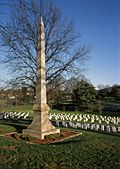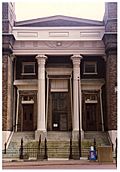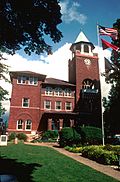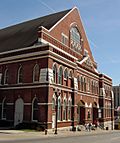List of National Historic Landmarks in Tennessee facts for kids
Tennessee is home to many important places that tell stories about its past! These special spots are called National Historic Landmarks. They are recognized by the United States government for being super important to the history of our country.
There are 31 National Historic Landmarks completely within Tennessee. One more landmark is partly in Tennessee and partly in Mississippi. All these landmarks are also listed on the National Register of Historic Places.
Besides these landmarks, there are six other historic places in Tennessee managed by the National Park Service. These include:
- Cumberland Gap National Historical Park (shared with Kentucky and Virginia), started in 1940.
- The Andrew Johnson National Historic Site, which honors President Andrew Johnson.
- Four sites from the American Civil War:
- Chickamauga and Chattanooga National Military Park (shared with Georgia), started in 1890. It includes the Moccasin Bend Archeological District, which is also a National Historic Landmark.
- Fort Donelson National Battlefield, started in 1928.
- Shiloh National Military Park, started in 1894. Ancient Native American mounds in this park are also a National Historic Landmark.
- Stones River National Battlefield, started in 1927.
Current National Historic Landmarks
| Landmark name | Image | Date designated | Location | County | Description | |
|---|---|---|---|---|---|---|
| 1 | Beale Street Historic District |
(#66000731) |
Memphis 35°08′22″N 90°03′07″W / 35.1394°N 90.0519°W |
Shelby | This street is known as the birthplace of the blues music style. Many important developments in African-American music and American music happened here. W.C. Handy, a famous musician, was a big part of Beale Street when it was full of lively music and theaters. | |
| 2 | William Blount Mansion |
(#66000726) |
Knoxville 35°57′40″N 83°54′55″W / 35.9611°N 83.9152°W |
Knox | This was the home of William Blount from 1792 until he passed away in 1800. Blount was a key figure in early American history. He helped write the U.S. Constitution, was the governor of the Southwest Territory, helped Tennessee become a state, and later served in the U.S. Senate. | |
| 3 | Chucalissa Site |
(#73001830) |
Memphis 35°03′45″N 90°07′44″W / 35.0625°N 90.1289°W |
Shelby | This archaeological site has ancient mounds from the Mississippian period (around the 15th century). It has very well-preserved items like old buildings, plants, animals, and human remains, giving us clues about the past. | |
| 4 | Delta Queen (River Steamboat) |
(#70000495) |
Chattanooga 35°03′36″N 85°18′31″W / 35.0599°N 85.3086°W |
Hamilton | The Delta Queen is a historic river steamboat. | |
| 5 | Fort Armistead |
(#100009828) |
Coker Creek vicinity |
Monroe | This site was used to hold Native Americans during the Trail of Tears. It was also important during the American Civil War. | |
| 6 | Fort Loudoun |
(#66000729) |
Vonore 35°35′45″N 84°12′13″W / 35.5958°N 84.2036°W |
Monroe | The British built Fort Loudoun in 1756 during the French and Indian War. It was meant to protect British lands and was allied with the Cherokee people. However, the Cherokee later became hostile and surrounded the fort, leading to its surrender in 1760. | |
| 7 | Fort Pillow |
(#73001806) |
Henning 35°38′10″N 89°50′32″W / 35.6361°N 89.8422°W |
Lauderdale | During the American Civil War, the Confederate army won the Battle of Fort Pillow in April 1864. Sadly, many Black Union soldiers were killed in this battle. This event became a sad moment in history and a battle cry for Black soldiers for the rest of the war. | |
| 8 | Franklin Battlefield |
(#66000734) |
Franklin 35°54′13″N 86°51′58″W / 35.9036°N 86.8661°W |
Williamson | The Civil War Battle of Franklin happened here on November 30, 1864. Union troops successfully fought off many attacks from Confederate forces. The Confederates suffered huge losses, which greatly weakened their army. | |
| 9 | George Peabody College for Teachers |
(#66000723) |
Nashville 36°08′30″N 86°47′55″W / 36.1417°N 86.7986°W |
Davidson | This college was the first to receive money from the Peabody Education Fund. This fund was created by George Peabody to help rebuild education in the South after the Civil War. The college started training teachers in 1875 and officially changed its name in 1909. | |
| 10 | Graceland |
(#91001585) |
Memphis 35°02′46″N 90°01′23″W / 35.0461°N 90.0231°W |
Shelby | Graceland was the home of Elvis Presley for 20 years, starting in 1957. It is strongly connected to his music and career. Elvis had a huge impact on American music and culture in the 20th century. He is in the Rock and Roll, Gospel, and Country Halls of Fame. | |
| 11 | The Hermitage |
(#66000722) |
Nashville 36°12′54″N 86°36′47″W / 36.2150°N 86.6130°W |
Davidson | This large farm was the home of Andrew Jackson from 1804 until he passed away. He built the beautiful Greek Revival style house in 1819. Andrew Jackson served as President of the United States from 1829 to 1837. | |
| 12 | Hermitage Hotel |
(#100005652) |
231 6th Ave., N. 36°09′47″N 86°47′01″W / 36.1631°N 86.7836°W |
Davidson | This hotel is important because of its role in the movement for women's right to vote. | |
| 13 | Hiram Masonic Lodge No. 7 |
(#73001859) |
Franklin 35°55′31″N 86°52′01″W / 35.9253°N 86.8670°W |
Williamson | Hiram Masonic Lodge No. 7 is the oldest public building in Franklin. It is also the oldest Masonic Hall in Tennessee that has been used continuously. In 1830, the Treaty of Franklin was signed here. This treaty led to the removal of the Chickasaw people from their homeland. President Andrew Jackson himself opened the meeting. | |
| 14 | Jubilee Hall, Fisk University |
(#71000817) |
Nashville 36°10′08″N 86°48′17″W / 36.1689°N 86.8047°W |
Davidson | Fisk University was started in 1865 to provide education for Blacks after the Civil War. Jubilee Hall, finished in 1876, is the oldest building on campus. It is built in the Victorian Gothic style. | |
| 15 | Long Island of the Holston |
(#66000733) |
Kingsport 36°31′49″N 82°33′39″W / 36.5303°N 82.5608°W |
Sullivan | Long Island was a very important and sacred meeting and treaty place for the Cherokee people. In 1775, Daniel Boone started from here to create the Wilderness Road through the Cumberland Gap. Over time, the island has changed a lot due to factories and buildings. | |
| 16 | Moccasin Bend Archeological District |
(#86003510) |
Chattanooga 35°02′09″N 85°20′12″W / 35.0359°N 85.3368°W |
Hamilton | This archaeological site along the Tennessee River has many different Native American remains. These include items from the Archaic, Woodland, and Mississippian periods. Spanish artifacts from the 16th century show early meetings between Europeans and Native Americans. There are also earthworks from the Civil War Battle of Chattanooga. | |
| 17 | Montgomery Bell Tunnel |
(#94001188) |
White Bluff 36°08′48″N 87°07′20″W / 36.1468°N 87.1221°W |
Cheatham | This is the oldest known full-size tunnel in the United States. It was built in 1818–1819 by Montgomery Bell to move water and create power for industries. Building it was very hard work, done by hand by slaves using tools like hammers and chisels. | |
| 18 | Mountain Branch, National Home for Disabled Volunteer Soldiers |
(#11000560) |
Johnson City 36°18′38″N 82°22′24″W / 36.3106°N 82.3733°W |
Washington | This site includes the Mountain Home National Cemetery and the nearby VA campus. It was a home for soldiers who were disabled. | |
| 19 | Old First Presbyterian Church |
(#70000608) |
Nashville 36°09′47″N 86°46′47″W / 36.163°N 86.7798°W |
Davidson | The famous architect William Strickland designed this church in the Egyptian Revival style. Strickland was one of the most important architects in the U.S. when he built this church in 1849. Its unique Egyptian style led to it being called "Karnak on the Cumberland." | |
| 20 | Pinson Mounds |
(#66000727) |
Pinson 35°29′52″N 88°40′57″W / 35.4978°N 88.6825°W |
Madison | This site was used as early as 5000 BC. It mainly consists of mounds built during the Middle Woodland Period (around 500 B.C. – 500 A.D.). There are two temple mounds, one effigy mound (shaped like an animal), and other earthworks. | |
| 21 | James K. Polk Home |
(#66000728) |
Columbia 35°36′54″N 87°02′14″W / 35.6149°N 87.0373°W |
Maury | This house was built in 1816. It was the home of future President James K. Polk for six years when he was a young man. | |
| 22 | Rattle and Snap |
(#71000825) |
Columbia 35°33′40″N 87°09′23″W / 35.5611°N 87.1563°W |
Maury | This large house was built in the Greek Revival style by a relative of President James K. Polk. It has a special Corinthian portico (a porch with columns). | |
| 23 | Rhea County Courthouse |
(#72001251) |
Dayton 35°29′42″N 85°00′46″W / 35.4949°N 85.0127°W |
Rhea | This courthouse was the setting for the famous Scopes Trial in July 1925. In this trial, teacher John T. Scopes was accused of teaching Charles Darwin's theory of evolution in his public school classes. The trial became a big debate between lawyers William Jennings Bryan and Clarence Darrow, showing the tension between traditional and modern ideas in American society. | |
| 24 | Ryman Auditorium |
(#71000819) |
Nashville 36°09′41″N 86°46′43″W / 36.1613°N 86.7785°W |
Davidson | This auditorium was the home of the Grand Ole Opry for 31 years, from 1943 to 1974. The Opry, with its live music shows and radio programs, greatly shaped the development of country music. | |
| 25 | Siege and Battle of Corinth Sites |
(#91001050) |
Pocahontas 35°01′51″N 88°47′44″W / 35.0308°N 88.7956°W |
Hardeman | This site is mostly in Alcorn County, Mississippi. It was the location of several American Civil War battles and military actions around Corinth, Mississippi. A small part of the Davis Bridge Battlefield is also here. | |
| 26 | Shiloh Indian Mounds Site |
(#79000279) |
Hurley 35°08′29″N 88°19′15″W / 35.1415°N 88.3208°W |
Hardin | This is the largest remaining fortified Mississippian ceremonial mound complex in the Tennessee Valley. It includes six Mississippian temple mounds, one Woodland burial mound, an old village site, and the remains of a palisade (a fence of strong posts). | |
| 27 | Sun Record Company |
(#03001031) |
Memphis 35°08′21″N 90°02′16″W / 35.1392°N 90.0377°W |
Shelby | Sam Phillips started this music recording studio in 1952. Many of the greatest names in rock and roll were discovered or recorded here. These include Elvis Presley, Johnny Cash, Jerry Lee Lewis, and many others. Sun Studio had a huge impact on American music and culture. | |
| 28 | Sycamore Shoals |
(#66000721) |
Elizabethton 36°20′33″N 82°15′21″W / 36.3425°N 82.2558°W |
Carter | The Treaty of Sycamore Shoals was signed here with the Cherokee in 1775. This treaty allowed the United States to gain a huge amount of Cherokee land and encouraged people to settle in what is now Kentucky. Sycamore Shoals later became a gathering place for soldiers during the American Revolutionary War. | |
| 29 | Tennessee State Capitol |
(#70000894) |
Nashville 36°09′57″N 86°47′03″W / 36.1658°N 86.7842°W |
Davidson | This beautiful building is a great example of Greek Revival architecture. It has four Ionic porticos (porches with columns) and a simple, well-designed inside. It was built between 1845 and 1859 by the famous architect William Strickland. | |
| 30 | Wynnewood |
(#71000838) |
Castalian Springs 36°23′39″N 86°18′59″W / 36.3942°N 86.3164°W |
Sumner | This was one of the first settlements in Middle Tennessee. Today, it still has six log buildings near a sulfur spring. The main house, built in 1828, was a stagecoach inn (a place for travelers to stay) and a home. | |
| 31 | X-10 Reactor, Oak Ridge National Laboratory |
(#66000720) |
Oak Ridge 35°55′35″N 84°18′59″W / 35.9263°N 84.3165°W |
Roane | This nuclear reactor was the main atomic research center in the United States. It was the first full-scale reactor in the world, built in 1943. It helped create plutonium and later, medical radioisotopes (special materials used in medicine). | |
| 32 | Alvin Cullom York Farm |
(#76001773) |
Pall Mall 36°32′32″N 84°57′37″W / 36.5422°N 84.9603°W |
Fentress | During World War I, Sergeant Alvin C. York showed incredible bravery at the 1918 Battle of the Argonne Forest. He single-handedly captured many enemy soldiers and machine guns. York received the Medal of Honor for his actions. He lived at this farm from 1922 until he passed away in 1964. |
Former National Historic Landmarks
Here is information about two properties in Tennessee that used to be National Historic Landmarks but no longer are.
| Landmark name | Image | Date of designation | Date of withdrawal | Locality | County | Description | |
|---|---|---|---|---|---|---|---|
| 1 | Isaac Franklin Plantation |  |
1977 | 2005 | Gallatin 36°20′41″N 86°29′36″W / 36.344793°N 86.493195°W |
Sumner | Fairvue Plantation was built in 1832. It lost its landmark status because of changes made to the property, including building a golf course community around the home. |
| 2 | Nashville Union Station and Trainshed | 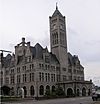 |
1975 | 2003 | Nashville 36°09′26″N 86°47′05″W / 36.1572°N 86.7848°W |
Davidson | This station and its trainshed were built in the 1890s. They were a major stop for trains carrying passengers to the Midwest and West. The trainshed was taken down in 2001 because it was no longer safe. This led to the station losing its National Historic Landmark status. |
See also
- List of National Park Service areas in Tennessee
- List of National Historic Landmarks by state
- National Register of Historic Places listings in Tennessee
Black History Month on Kiddle
Influential African-American Artists:
 | James Van Der Zee |
 | Alma Thomas |
 | Ellis Wilson |
 | Margaret Taylor-Burroughs |

All content from Kiddle encyclopedia articles (including the article images and facts) can be freely used under Attribution-ShareAlike license, unless stated otherwise. Cite this article:
List of National Historic Landmarks in Tennessee Facts for Kids. Kiddle Encyclopedia.









